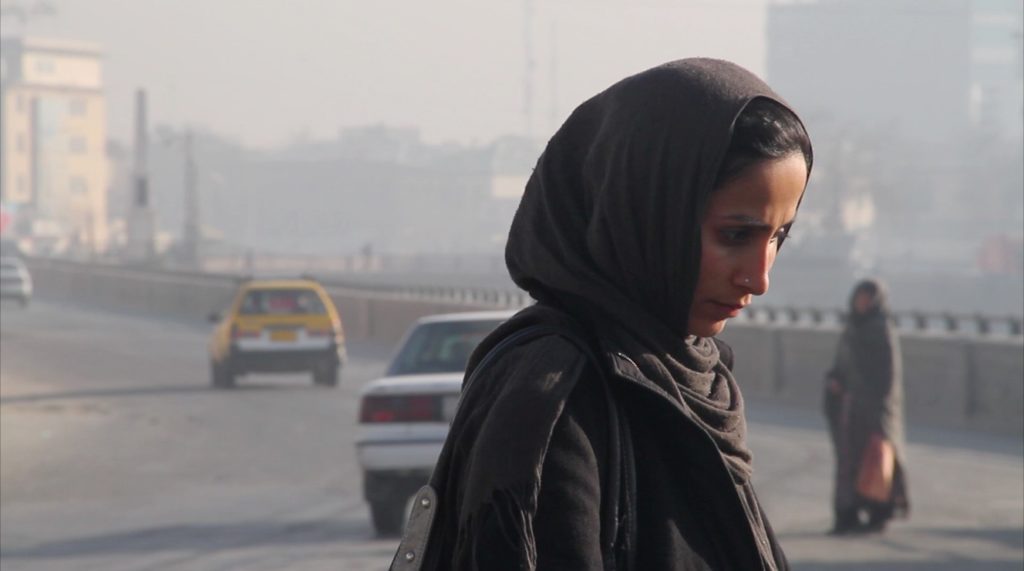Sahra Mani is an award-winning documentary filmmaker, university lecturer, and founder of Afghanistan Documentary House. Her films include “Kaloo School” and “Beyond the Burka.”
“A Thousand Girls Like Me” will screen at the 2019 Full Frame Film Festival on April 4.
W&H: Describe the film for us in your own words.
SM: I was watching television at my home at Kabul, Afghanistan when I saw a news story — a little girl talking about a horrible case of incest that happened in her house. I decided to find her to see if I could help her. After one week, I was sitting in front of her. A few weeks later when she found out that I was a filmmaker, she said she always wanted someone to make a film about her life.
I agreed to do it but didn’t know if I would actually be able to make a film about her story—about what happened in her house. The story was heavy and dark, and I did not know how to tell it.
W&H: What drew you to this story?
SM: Initially, the fact that the protagonist was my hero. She has a very brave and charismatic personality. Then I was drawn to the importance of her story, and the stories of other women who seek justice and who have to go a long way to prove they are not guilty, even in the most challenging cases. Our judicial system is sick and needs to change its attitude about who comes and asks for justice.
W&H: What do you want people to think about when they are leaving the theater?
SM: I hope audiences are inspired witnessing Khatera’s fight as well as her bravery and resilience and the love she spread to others. Audiences might also appreciate what they have in their own life and think about how lucky they are to be born in a different part of the world.
But whatever they come away with, I hope they start thinking about how they can help to achieve peace all around the world.
W&H: What was the biggest challenge in making the film?
SM: Security is always a big challenge in my country. Khatera’s safety was at risk from her uncles, and I was at risk along with her. We also face several suicide attacks every day in Afghanistan.
The judicial System of Afghanistan didn’t want me to make this film. They did not let me follow Khatera into court. They tried to stop me, but I did not give up.
W&H: How did you get your film funded? Share some insights into how you got the film made.
SM: I had difficulty financing this film at first. I have to say thank you to Sundance Institute, Fork Films, Chicken and Egg, and Women Make Movies. They trusted me in the beginning steps. I think filmmaking is all about having a good team around you, especially for filmmakers from developing countries, as we don’t have any support from our government and professional productions teams.
I shot most of the interiors myself and also edited my grant trailer. I believe that having some technical skills is essential for documentary filmmakers.
W&H: What inspired you to become a filmmaker?
SM: I like story telling. I love cinema as an art form. I think cinema has magic. I hope that by making films, I can bring small changes for women in my country. I hope I can inspire others by sharing the stories of brave people. I hope I can bring people close to each other and my films can break the barriers in front of us.
Film allows us to feel the pain of others and feel empathy for people who are living in different situations. I hope that this empathy can help us love each other more.
W&H: What’s the best and worst advice you’ve received?
SM: Best: You can reach whatever you want. Just move, work hard, and relax, and you’ll achieve your dream.
Worst: Don’t play around with your life. It takes so long to reach your goals.
W&H: What advice do you have for other female directors?
SM: Filmmaking is not an easy job. Filmmaking is a crazy job for crazy people who don’t want to have an easy life. If you are not crazy enough, then good for you. Go and get a job and have a peaceful life.
W&H: Name your favorite woman-directed film and why.
SM: I like Kim Longinotto’s films and my University of the Arts London professor Nancy Platt’s films. I also like Kirsten Johnson’s documentary “Cameraperson,” and I very much like Patty Jenkins’s films, especially “Monster.”
W&H: It’s been a little over a year since the reckoning in Hollywood and the global film industry began. What differences have you noticed since the #MeToo and #TimesUp movements launched?
SM: I think that #MeToo brought some brave acts to our world. I believe we need some more brave acts like these.







